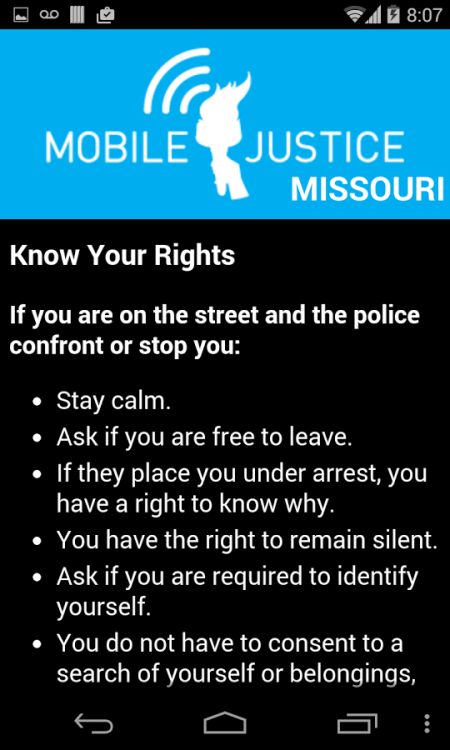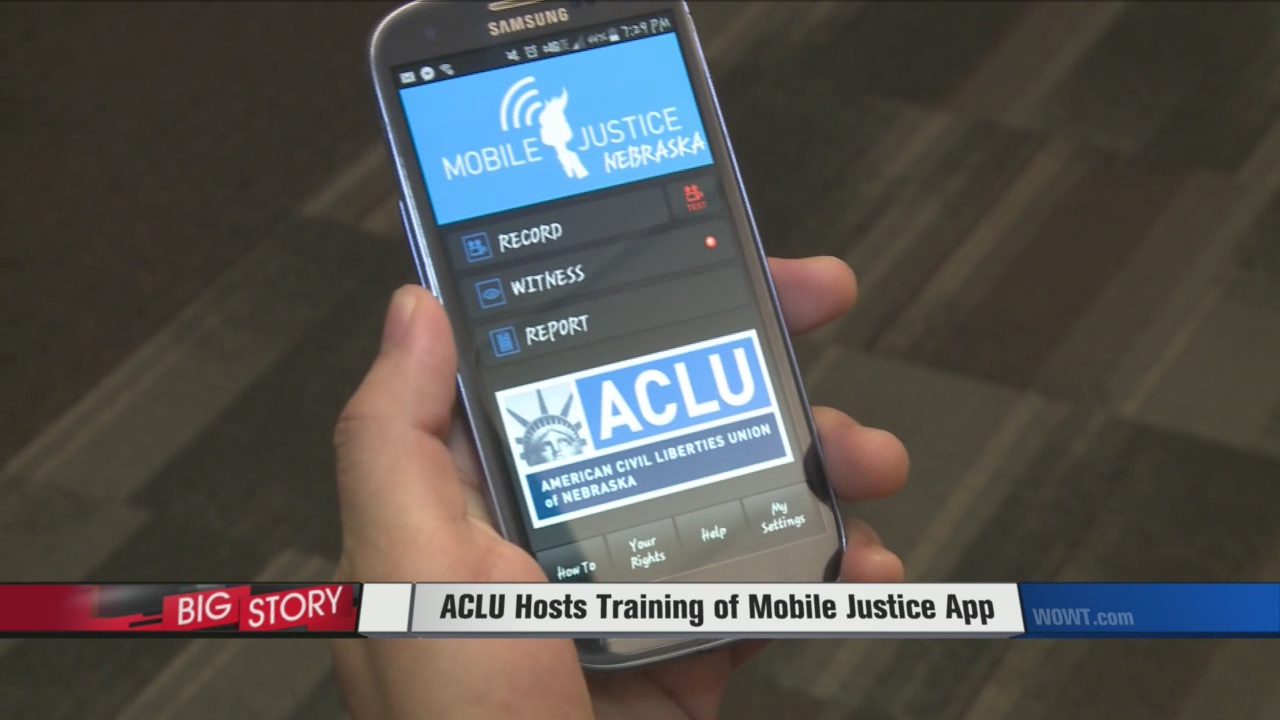
During the Occupy movement’s initial rise across America in the fall 2011, hardly a day went by without viral videos showing the blatant misconduct of our nation’s police officers dispersing protests. News headlines of young people being dragged, choked, beaten and pepper-sprayed seem to a be a herald of the changing political climate – and a wake-up call to those who believe law enforcement should honor the public’s right to conscientiously object.
Now, America’s state of racial unrest has brought even more unwanted attention to law enforcement, as a string of officers remain legally unscathed despite the high profile wrongful deaths of Michael Brown, Tamir Rice, Eric Garner and so many others – catalyst events that once again have sent protesters clashing with police.
This time, however, those protesters in some regions are equipped with a tool designed to hold police accountable – and it's one that can be traced back to the early days of the Occupy movement. The Mobile Justice app was designed by visual artist Jason Van Anden and was first called “I’m Getting Arrested.” It let Occupy protesters alert each other when they were being physically detained by the police; by allowing users of the app to gather at the first sign of wrongful arrest or abuse of liberties, more eyes would be present to expose police brutality with video evidence.
It’s no surprise, now that protest culture has made social media and smartphones vehicles for political change, that the federal government is attempting to regulate those forms of communication. Last September, FBI Director James Corney was vocal about his disappointment that Apple had decided to no longer unlock iPhones at the request of law enforcement. All too often, video evidence that could incriminate police is subject to confiscation and or deletion after arrest, making the design of Mobile Justice that more crucial for exposing abuses.
Working with your phone’s camera, Mobile Justice allows users to take video of public exchanges with police and other citizens. When the video has ended, it automatically uploads to the American Civil Liberties Union, keeping the file from being deleted if the phone is confiscated. The other functions include a “Witness” function, which is identical to “I’m Getting Arrested,” by alerting other Mobile Justice users nearby to assist in recording. The “Report” function allows for a more-detailed account of people's interactions with police by filing an incident report that gets sent directly to the ACLU.
Mobile Justice is available for download through the ACLU offices in Missouri, Mississippi, Nebraska and Oregon. The app already had a direct role helping combat racial profiling in New Jersey and New York, where it was known as “Stop and Frisk Watch” and has been downloaded over 30,000 times. It was a direct response to the chronic misuse of police authority in making random stops of citizens, and disproportionately Blacks and Latinos.
The events of Ferguson made the need for Mobile Justice technology in Missouri abundantly clear. Yet with the footage of Eric Garner’s wrongful death at the hands of the NYPD still not resulting in a conviction, the effectiveness of the app is difficult to forecast. In Oregon, the Portland Police Department has taken a progressive approach. They’ve embraced Mobile Justice as way to remain transparent so that questionable officers are weeded out.
“We don't want anyone to interfere in the interactions of the police if they are talking to someone or making an arrest. That's something officers do have the legal right to do, to ask people to back away,” confirmed Sergeant Peter Simpson of the Portland P.D. “This app may help some people feel more comfortable with their interactions with the police, [and] from that standpoint we really don't have an issue with people wanting to do that.”
 Yet according to ACLU representative Sarah Armstrong, there is definite need for the Mobile Justice app in Oregon, and the cases coming in are supporting that. “We hear all the time from people who say they’re harassed, bullied, or even ordered to stop filming,” said Armstrong. “People are hesitant to report misconduct because they feel they won’t be believed.”
Yet according to ACLU representative Sarah Armstrong, there is definite need for the Mobile Justice app in Oregon, and the cases coming in are supporting that. “We hear all the time from people who say they’re harassed, bullied, or even ordered to stop filming,” said Armstrong. “People are hesitant to report misconduct because they feel they won’t be believed.”
The release of Mobile Justice comes as the Obama Administration has announced that the federal government will spend $75 million on body cameras for law enforcement officers. But until the practice of recording yields an appropriate punishment for officers who step outside the law, the value of retained footage as evidence still seems murky. Under the status quo, punishment by law enforcement makes an example of the individual, but we have yet to see a case of law enforcement making an example of one of their own – even when they are caught on camera.
Even before Mobile Justice was released, there was already an entity, called Cop Block, monitoring police brutality and directing public attention at curbing police abuses. “Cop Block is a decentralized effort started to support those wronged by police employees,” explained Peter, the organization's founder. “By documenting the subpar 'service' that typifies police action, it not only focuses attention on the individual aggressor…but makes clear the problem is systemic.”
Any number of the current entries on CopBlock.org features citizens subject to abuse by the police. The incidents aren't only widespread throughout the country, but depict the clear identity of each offender. It’s too soon to say whether people will start coming forward in record numbers through outlets like Mobile Justice and Cop Block, or if reckless and dehumanizing behavior by law enforcement is now the norm.
“The Mobile Justice app is a welcomed tool to document the pattern of police employee unaccountability,” added Peter. “As those institutionalized double standards are recognized, more individuals who value peace and consensual interactions will choose to no longer grant it perceived legitimacy.”
During protests, especially when the threat of violence is imminent, keeping oneself at a safe distance could be the difference between having the documentation to potentially end a police officer’s career, or being identified and treated as a combatant. The Mobile Justice isn't designed for filming if you – yourself – are stopped by police, but rather is meant to record events as a third party when one witnesses others engaged by the police.
“It’s not that you’re not allowed to film police when you’re being stopped, but if you think about the mechanics of it, it might not be the best idea to reach into your pocket to pull out your phone to do it,” clarified Armstrong. “So part of elevating the conversation is letting people know, ‘Hey, you can do this for your fellow community members.’ The police can ask you to back up, but you are allowed to film.”
Mobile Justice can be seen as attempt to take power back from law enforcement, and to make sure that unlawful transgressions against civilians don't go unnoticed. But police still wield great power in deciding when and if they can be filmed. “If you're looking to record an interaction that the police have with someone, it's better to be farther back to get a broad picture of what's going on,” said Sgt. Simpson of the Portland P.D. “You're going to catch more of the action with a wider screen or wider lens then you would right in the middle of something.”
There were no smartphones present during the fatal police shooting of 12-year-old Tamir Rice in Cleveland last November, but there was a security camera positioned far enough away to catch the entire incident. Yet Cleveland Mayor Frank G. Jackson denies “systemic failure” as the cause either for Rice’s death, the delay in medical attention, or the assault and detainment of Rice’s sister on the scene.
In New York, NYPD Union President Patrick Lynch went as far to say the cause of Eric Garner’s death by suffocation at the hands of police was his own fault: because he resisted. Compared to the footage in the Tamir Rice killing, smartphone footage revealed Garner's pleas for air in close-up detail until he perished.
“We have all seen instances where video captures a piece of an interaction but doesn't reflect the true interaction,” added Simpson. “I think we have to acknowledge that people are upset, and understand that although these things happen in places thousands of miles away, people are going to maybe take that out on the person they see in front of them.”
Every year, the Oregon ACLU receives over 2,000 requests via email or phone for legal assistance. With Mobile Justice acting as a direct pipeline to register complaints, that number is expected to grow. The videos the group receives are also intended to further the public's conversation about police practices with lawmakers and legislators.
“Hopefully by launching the app we’re letting people know that they have the right to film police,” explained Armstrong. “They can film police interactions that they see happening as a way to show police that we’re watching – and that we will hold police to the standards that the communities says are what we need.”
3 WAYS TO SHOW YOUR SUPPORT
- Log in to post comments












